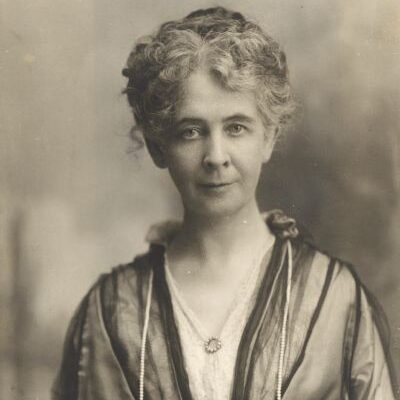Theodora Winton was born on February 1, 1863, in Ashippun, Wisconsin. Showing an early talent for writing, she attended Carroll Academy (now Carroll University) and graduated as valedictorian at age 17. In the 1880s, she began working as a writer for the Waukesha Freeman newspaper. In 1887, she wrote her first “Women’s World” column, which covered women’s political progress, women’s clubs’ activities, and other topics important to women. Her first column was so popular that it became a regular feature, making her the first woman staff reporter at the paper. In 1889, she married Henry Youmans, the editor of the Freeman. The following year, she was promoted to associate editor of the paper.
Winton was a leader in local women’s clubs, which were often places of education, charity, and social reform for women. In 1886, she was elected district president of the Waukesha Women’s Club, and three years later, she became president of the Wisconsin Federation of Women’s Clubs. The governor appointed her to the state’s 50th anniversary celebration committee in 1889. In 1905, she was the first woman named to the Board of Regents of Normal Schools (now part of the University of Wisconsin Board of Regents), to which the following two governors reappointed her.
Women’s suffrage (right to vote) became her primary focus in the 1910s. In 1911, she was recruited by Ada James, the president of the Political Equality League (PEL), to be the league’s press correspondent. Youmans also served on the PEL’s board. The same year, she transformed her column in the Freeman into a suffrage column called “Votes for Women.” In 1912, a Wisconsin referendum on women’s suffrage did not pass. After this setback, the PEL and the Wisconsin Women’s Suffrage Association (WWSA) merged. Members of both organizations wanted Youmans to lead the new WWSA. Initially, she refused the position, but in 1913, she became president of the WWSA and the chair of the press committee. Her writing had a big impact on public opinion of women’s suffrage in Wisconsin. She sent weekly press releases to more than 600 newspapers and was credited with convincing clubwomen to support suffrage. In 1919, Wisconsin became the first state to ratify the 19th Amendment to the U.S. Constitution, which allows for women’s right to vote.
After Wisconsin’s ratification, the WWSA became the League of Women Voters of Wisconsin, and Youmans served as its first vice president. She went on to be involved in the Republican Party. In 1920, she was the only woman appointed to the Republican Party Platform Committee. She also served as vice president of the Republican Women’s Organization in Wisconsin. In 1922, she ran for state senate but lost due to a lack of support from her party. Despite this, Youmans encouraged women to join political parties and traveled around the state educating women about the Republican Party.
Youmans retired from the Freeman in 1920. She returned to the Waukesha Women’s Club and served two more terms as district president. She died August 17, 1932.
LEARN MORE
McBride, Genevieve G. On Wisconsin Women: Working for Their Rights from Settlement to Suffrage. University of Wisconsin Press, 1994.
McBride, Genevieve G. Women’s Wisconsin: from Native Matriarchies to the New Millennium. Wisconsin Historical Society Press, 2005.
Stanton, Elizabeth Cady, et al. History of Woman Suffrage. 1900-1920. Arno Press, 1969.
Wisconsin History Society. “Theodora Winton Youmans and Women’s suffrage,” n.d., https://www.wisconsinhistory.org/Records/Article/CS563.
Youmans, Theodora W. “How Wisconsin Women Won the Ballot,” The Wisconsin Magazine of History, 1921. https://digicoll.library.wisc.edu/WIReader/WER0124-1.html
Photo courtesy of the Wisconsin Historical Society Archives, Image ID 142391.
Profile written by Emma McClure, Student Coordinator for Wisconsin Women Making History.
